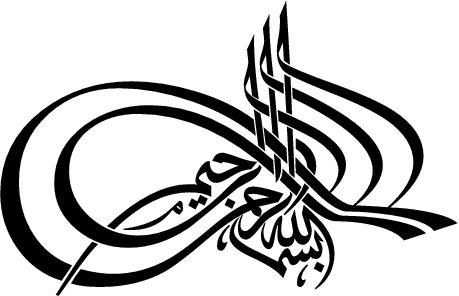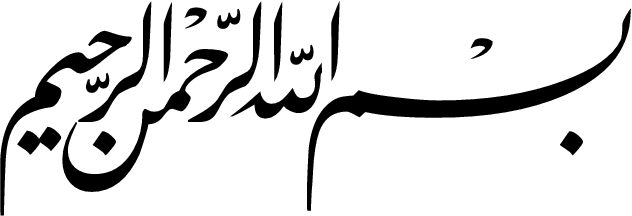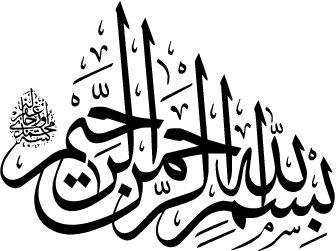|
1 |
﴾بِسْمِ اللهِ الرَّحْمَٰنِ الرَّحِيمِ﴿ |
١ |
|
Initial position |
Medial position |
Final position |
Independent position |
Transliteration |
Name of the letter |
|
ا |
ـا |
ـا |
ا |
ā |
Alif |
|
بـ |
ـبـ |
ـب |
ب |
b |
Bā’ |
|
تـ |
ـتـ |
ـت |
ت |
t |
Tā’ |
|
ثـ |
ـثـ |
ـث |
ث |
th |
Ṯā’ |
|
جـ |
ـجـ |
ـج |
ج |
j |
Ǧīm |
|
حـ |
ـحـ |
ـح |
ح |
ḥ |
Ḥā’ |
|
خـ |
ـخـ |
ـخ |
خ |
kh |
Ḫā’ |
|
د |
ـد |
ـد |
د |
d |
Dāl |
|
ذ |
ـذ |
ـذ |
ذ |
dh |
Ḏāl |
|
ر |
ـر |
ـر |
ر |
r |
Rā’ |
|
ز |
ـز |
ـز |
ز |
z |
Zāy |
|
سـ |
ـسـ |
ـس |
س |
s |
Sīn |
|
شـ |
ـشـ |
ـش |
ش |
sh |
Šīn |
|
صـ |
ـصـ |
ـص |
ص |
ṣ |
Ṣād |
|
ضـ |
ـضـ |
ـض |
ض |
ḍ |
Ḍād |
|
طـ |
ـطـ |
ـط |
ط |
ṭ |
Ṭā’ |
|
ظـ |
ـظـ |
ـظ |
ظ |
ẓ |
Ẓā’ |
|
عـ |
ـعـ |
ـع |
ع |
‛ |
‛Ain |
|
غـ |
ـغـ |
ـغ |
غ |
gh |
Ġain |
|
فـ |
ـفـ |
ـف |
ف |
f |
Fā’ |
|
قـ |
ـقـ |
ـق |
ق |
q |
Qāf |
|
كـ |
ـكـ |
ـك |
ك |
k |
Kāf |
|
لـ |
ـلـ |
ـل |
ل |
l |
Lām |
|
مـ |
ـمـ |
ـم |
م |
m |
Mīm |
|
نـ |
ـنـ |
ـن |
ن |
n |
Nūn |
|
هـ |
ـهـ |
ـه |
ە |
h |
Hā’ |
|
و |
ـو |
ـو |
و |
w, ū |
Wāw |
|
يـ |
ـيـ |
ـي / ـى |
ي / ى |
y, ī |
Yā’ |
6
|
1 |
﴾بِسْمِ اللهِ الرَّحْمَٰنِ الرَّحِيمِ﴿ |
١ |
-
The first letter of the alphabet is Hamza. However, since Alif is usually the chair of the Hamza, it comes first in the alphabet. Hamza chairs can also be ؤ (Wāw) or ئـ / ـئـ / ئ (Yā’). Hamza can also occur independently ء.
-
However, Hamza can also occur independently: أَنْتَ ‘anta (you), أُمّ ‘umm (mother), إِنْ ‘in (if).
-
In this textbook for methodological reasons the Hamza vocalized with Fatḥa and sitting on Alif as chair is always written أَ, except for the Hamzat waṣl (↑L2).
-
Alif at the end of a word may also indicate the accusative and should be read »–an« zu lesen: šukran شُكْرًا (Thank you).
-
This textbook does not consider Hamza in the initial position when transliterating Arabic words. Thus, words like أَنْتَ، أُمّ، إِنْ are written umm, anta, in and not ‘umm, ‘anta, ‘in.
-
At the end of a word Yā’ (ى) without the two dots below may also express a long ā. Thus, in order to differentiate it from Yā’, pronounced as ī, it is usually written with the two dots in the final position: ي.
-
Allāh (God) is always written in the form الله. The Shadda above the Lām shows the doubling of the Lām; the small Alif above the Shadda (dagger Alif) indicates the pronunciation of a long ā. Reading Arabic calligraphy requires some experience. The following images stand for In the Name of God, the Merciful, the Compassionate:
|
|
 |
 |
7

